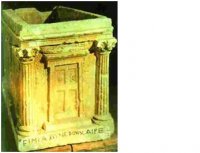- Член од
- 20 февруари 2008
- Мислења
- 210
- Поени од реакции
- 3
не знаев дека книгата на овој мајмун е бест селер во Македонија!!!ја знаете вистината и кутите:nesvest: .Енхалон, браво царе, измисли топла вода. Трк да си ја подигнеш нобеловата.
Тоа што го постираш, е веќе побиено.
Провокацијата ти е неуспешна. Ама баш сакам да направиш вака: Намали го фонтот, и отвори нова тема, специјално за „лагите“...Може? :smir: Таму ќе се разбереме...
Знам дека си ми лут оти ви уочив дека Албанскиот јазик нема трошка сличност со Илирскиот...ама јебига бе друже...:naaa:
јас сакм само да те потцетувам дека си голем славјанин како бугарите. не сакам да те прам булгар посто е твое право да се нарекувас себеси националноста македонец но од големите славјани корени тоа ми е целта










